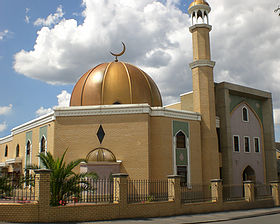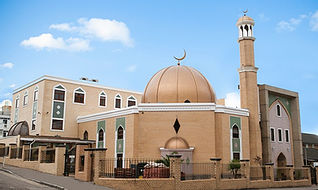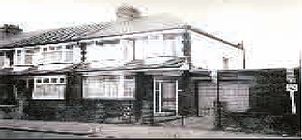Building a Legacy: Indo-Caribbean Mosques in the United Kingdom
- editorinchief8
- Mar 22, 2021
- 5 min read
Written by: Jana Ally
At the end of the Second World War, workers from Caribbean colonies were encouraged to emigrate and replenish the lack of labour in Britain. Much like most people who migrate to Britain, the Indo-Caribbean community never saw this as a permanent solution, rather a temporary opportunity to prosper.
In 1952, my grandfather, Nazeer Ally, migrated from Guyana to London at the young age of 24. He was one of the earlier migrants of the Windrush era and arrived with no family or friends. Upon arrival, he set out to gain education which wasn’t available to him back home. The Indo-Caribbean ethnic group was not only largely underrepresented during this era (some say due to the lack of representation of Indentured servitude as a whole), but the Muslim community within said group still remains a minority within the minority. During the time of Nazeer’s arrival, there were no butchers providing Halal meat and a lack of mosques for Muslims to worship in. As a practising Muslim, this posed a problem for the new life he intended to live in the ‘Motherland.’ Coming to the UK was an opportunity to build—build the country that to them had “streets paved in gold.”
But also to build their own lives as their ancestors once did when they boarded the ships docked in Calcutta.

As the years progressed and Nazeer was able to establish income and education, he sent for his wife and (eventually) his children to join him in the UK. In 1958, Nazeer purchased a store on Hessel Street, in which he would set up a Halal butcher to aid the lack thereof whilst also supplying to the Bangladeshi community that would attend the Commercial Road mosque. In 1959, he moved the butcher shop to Stoke Newington and settled into the community. By 1960, many families, both Afro and Indo-Caribbean were moving to the UK to benefit from the post-war lack of labour. During this time, Nazeer’s community consisted of his Muslim Indo-Caribbean family and the large Pakistani population that settled in the area. Due to the lack of mosques in the area, that year Nazeer held Eid salat (prayer) at his house.
This was the beginning of a long line of history regarding the Muslim Indo-Caribbean community in London. In the coming years Nazeer worked towards setting up places of worship for all Muslims in the area. Regardless of race or ethnicity, he saw a dyer need for spaces for the Muslim community and worked to provide that. In 1962, he converted the basement of his butcher shop into a mosque for the community in Stoke Newington. During the 1970’s, he led the Waltham Forest community to purchase a property that would be used as a mosque. The following year the next-door property was also purchased to contain the mosque in the basement, madrasa upstairs and the remaining rooms were let to Muslim students, which would fund the upkeep. In 1978, a carpet warehouse on Lea Bridge Road was purchased and turned into a mosque by Nazeer raising the funds through community collections, donations from prestigious individuals, and loans.
This mosque is still up and running to this day.

Simultaneously, during the 60’s, other family members known to me as, Mohammed Hasan (my grandmother’s brother), Salim Karim (my grandfather’s cousin) and Abdool Alli (my grandfather’s brother-in-law) would produce gatherings amongst the Muslim Indo-Caribbean community in North London which in turn would eventually create the North London Jamaat that is still present today.
In 1983, the London Islamic Cultural Society was produced in the home of President Abdool Alli by a small group of Muslims, predominantly from Guyana. The main purpose of the society was to bring together and benefit the multi-ethnic community they found themselves in. In the beginning period of the society, all gatherings and Islamic events were held in Abdool Alli’s house until numbers grew and the society transitioned to using school halls. In 1985, LICS purchased their first centre which was held in a house, this was able to be bought by raising funds through donations and interest free loans. As the society grew in numbers, Abdool Alli and Imam Al Haj Ebrahim McDoom attended an auction to secure what was once a synagogue. This space allowed the society to grow its relationships with surrounding schools, communities, hospitals and police. 1991 marked another moment of expansion for the society as they were able to purchase more land from the Haringey council and by 1996 the society gained planning permission to start building Haringey’s first purpose-built mosque. By 2002, the new mosque was open to its community. During the next 10 years, the society would hold charity events, Islamic celebrations and weekend Islamic classes that my siblings and I would attend. In 2012, the mosque underwent a yearlong development process to update and modernise its facilities, costing an estimated £1.5 million and in 2013, it once again opened its doors to the public.
In 2018, after the passing of Abdool Alli, the mosque officially announced its release from any debt.
My grandfather, Nazeer Ally, passed away in the year 1994 and with that, left behind the incredible legacy of bravely coming to the UK with no one to meet on the other side. Alongside pioneering the supply of Halal meet for the East-London Muslim communities and successfully providing multiple spaces for the community to worship. My great-uncle, Mohammed Hasan passed away in 1971 and my uncle Salim Karim has also since passed. Their legacy lies in the currently standing North London Jamaat, a place of worship created for an ethnic group that was not embraced by its fellow Caribbean peers, nor its South Asian counterparts at the time of migration. It created a home for the minority that lay within a minority and most importantly, supplied a place of worship for its community in North London. Lastly, as mentioned, my uncle Alli passed away in 2018. At his mosque was where I spent most of my Saturdays as a child, where I felt like my most Caribbean self. Outside of this space I didn’t know what it meant to truly be Indo-Caribbean; from the array of sweet accents, spice filled cuisine and the sea of melanin that swept the mosque hall.
This unique experience wasn’t one that was available to me outside the masjid walls.
There are a multitude of mosques both cultural and not, situated around the UK but none quite like what these individual men created. These spaces were pockets into the extremely underrepresented ethnic group. Once you stepped through those doors you were transcended into a cultural fest and religious safe haven. With the support of their family and communities, these men lead an influential path that allowed the UK Muslim Indo-Caribbean community to be seen, which unfortunately isn’t a feeling felt often by the Indo-Caribbean community at large.








Commenti